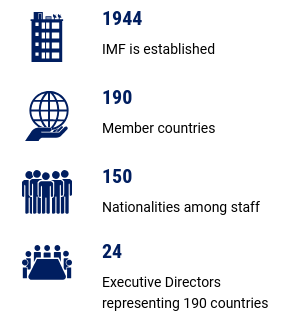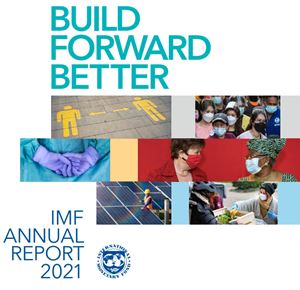We Are A Global Organization

The IMF was established in 1944 in the aftermath of the Great Depression of the 1930s. 44 founding member countries sought to build a framework for international economic cooperation. Today, its membership embraces 190 countries, with staff drawn from 150 nations.
The IMF is governed by and accountable to those 190 countries that make up its near-global membership.
How We Are Organized

At the top of its organizational structure is the Board of Governors. The day-to-day work of the IMF is overseen by its 24-member Executive Board, which represents the entire membership and supported by IMF staff. The Managing Director is the head of the IMF staff and Chair of the Executive Board. S/he is assisted by four Deputy Managing Directors.
Learn moreHow We Are Financed

The IMF's resources mainly come from the money that countries pay as their capital subscription (quotas) when they become members. Each member of the IMF is assigned a quota, based broadly on its relative position in the world economy. Countries can then borrow from this pool when they fall into financial difficulty.
Learn moreLending
The IMF provides loans—including emergency loans—to member countries experiencing actual or potential balance of payments problems. The aim is to help them rebuild their international reserves, stabilize their currencies, continue paying for imports, and restore conditions for strong economic growth, while correcting underlying problems.
Learn how the IMF helped Ireland.
Learn moreSurveillance
The IMF monitors the international monetary system and global economic developments to identify risks and recommend policies for growth and financial stability. The Fund also undertakes a regular health check of the economic and financial policies of its 190 member countries. In addition, the IMF identifies possible risks to the economic stability of its member countries and advises their governments on possible policy adjustments.
Learn how the IMF helped Vietnam.
Learn moreCapacity Development
The IMF provides technical assistance and training to governments, including central banks, finance ministries, revenue administrations, and financial sector supervisory agencies. These capacity development efforts are centered on the IMF’s core areas of expertise ranging from taxation through central bank operations to the reporting of macroeconomic data. Such training also helps countries tackle cross-cutting issues, such as income inequality, gender equality, corruption, and climate change.
Learn how the IMF helped Colombia.
Learn moreIMF Facts

IMF Lending Facts

Key Topics
Learn more about:
Essential Reading
News and views from the IMF:





 The IMF and COVID-19
The IMF and COVID-19 Special Drawing Rights (SDR)
Special Drawing Rights (SDR) The IMF and Climate Change
The IMF and Climate Change Sovereign Debt Issues
Sovereign Debt Issues The IMF and Income Inequality
The IMF and Income Inequality Gender and the IMF
Gender and the IMF Countries and Regions
Countries and Regions Research
Research IMF Blog
IMF Blog Press Releases
Press Releases Speeches
Speeches Factsheets
Factsheets


